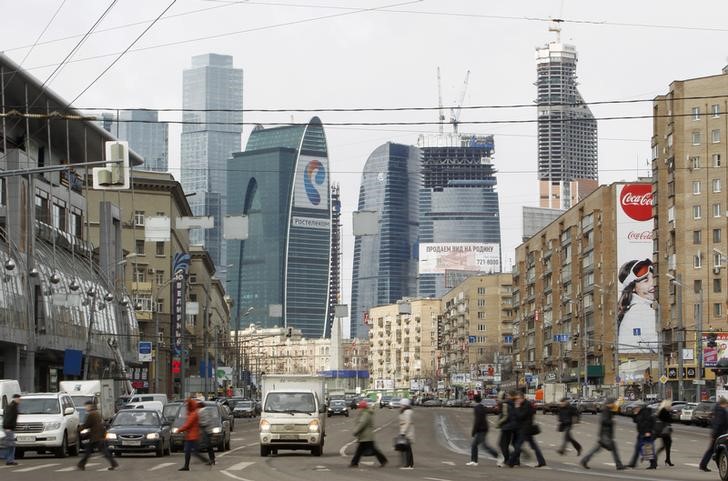By Karin Strohecker and Marc Jones
LONDON (Reuters) - The Kremlin's latest standoff with Ukraine in the Azov Sea is forcing foreign investors to reconsider Russia, which faces the possibility of even more stringent Western sanctions.
European Union leaders are expected to soon extend existing sanctions on Russia, although some senior politicians have also called for imposing fresh ones.
But the bigger risk is that Washington could opt to bar Russian banks such as Sberbank and VTB from operating in the United States and restrict their dollar access.
Somewhat less painful could be measures to restrict investors on buying new Russian government bonds.
The following charts show how foreign investors and Russian assets prices and fundamentals have reacted in recent years:
EBB AND FLOWS
Domestic OFZ sovereign bonds have been a lightning rod of sentiment towards Russia. A U.S. inquiry into election meddling and the poisoning of a former Russian spy in Britain this year have seen an almost 10 percent drop in foreign OFZ ownership.
Graphic: Russia portfolio flows - https://tmsnrt.rs/2PYLZFT
A drop in the rouble (RUB=) and a halt to central bank rate cuts mean Russian bonds have lost 12 percent in overall returns terms this year, compared to a 7 percent drop for JP Morgan's emerging markets bond index <.JGEGDCM>.
In the 4-1/2 years since Moscow's annexation of Crimea, both equity and debt markets have seen outflows and although OFZs had begun performing again, this year has knocked them back down.
Graphic: Russia's local debt markets - https://tmsnrt.rs/2PDlPrU
STOCKS
Non-Russian investors own 50-60 percent of the freefloat of Russian stocks and account for around half of 'secondary market' trading in Russian equities, the Moscow Exchange estimates.
An exodus of foreign investors could affect the largest and most traded stocks such as Sberbank (MM:SBER), VTB (MM:VTBR) or energy giants such as Rosneft (MM:ROSN) and Gazprom (MM:GAZP).
Some analysts point out that with more state-backed and other Russian firms now paying dividends than ever before, the overall dividend yield on Russia equities is now around 8 percent, compared with the emerging market average of 3 percent.
Sberbank offers 10 percent, or an even higher 12-13 percent on 'preferred' shares.
Analysts estimate this to be an all time high, whereas traditional price to earnings are around the historical average.
WEIGHT LOSS
Sanctioning Russian sovereign debt transactions would be one Washington's biggest financial levers. However, Moscow's slide down the investment league table means it wouldn't pack the same punch it once did.
Russia comprises currently around 3.6 percent of JPMorgan's EMBI Global "hard currency" sovereign bond index compared to 9 percent just over a decade ago.
It does have a higher 7.6 percent weight in the index for emerging local currency bonds, the GBI-EM - well off the 10 percent index-maximum it hit during the 2012-14 oil boom. On the CEMBI corporate debt index, Russian firms account for 5 percent, down from 14 percent 10 years ago.
Russia's financial institutions have also reduced their foreign currency exposure, Oxford Economics says, making them less vulnerable to external pressures. Credit institutions' foreign currency liabilities were just under $300 billion in October, compared to more than $400 billion in mid-2015.
Graphic: Russia weighting in global bond indexes - https://tmsnrt.rs/2K7y48s
RESERVES JUDGEMENT
Russian authorities have been praised for changes over the last six years designed to make Russia's economy less captive to oil's fortunes but also helped it navigate the sanctions stress.
A system in which the central bank buys dollars when oil and gas prices rise has seen it build up roughly $100 billion of extra reserves over the last 18 months, giving it roughly half a trillion dollars in total.
Meanwhile Russia has also ditched its holdings of U.S. Treasuries in the past few months as relations between Moscow and Washington have soured.
FOREIGN DIRECT INVESTMENT
Foreign direct investment stopped suddenly following the annexation of Crimea in 2014, though has since shown signs of recovery. Yet geopolitical tensions are just one part of the puzzle with investors also wary of tepid economic growth.
Russia's central bank predicted the economy could expand by no more than 2.0 percent. Evghenia Sleptsova at Oxford Economics calculated that sanctions had reduced potential growth, estimated at 1.3-1.4 percent, by around 0.4 percentage points.
Graphic: Russia foreign direct investment - https://tmsnrt.rs/2QZM3RS
(Reporting and graphics by Karin Strohecker and Marc Jones; Editing by Alexander Smith)
